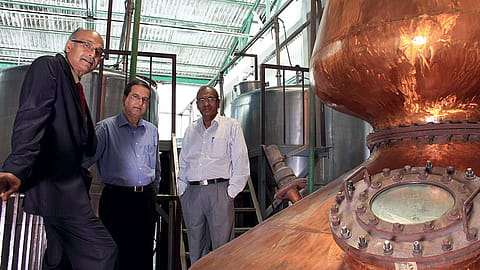Indian consumer brands that are winning the world
There is a small but significant trend in India. It is creating brands that are first successful in foreign countries before coming home.

The Araku Valley is one of the prettiest places in India. Heavily forested, it is nestled deep in the Eastern Ghats, a pulsating bit of tribal India full of waterfalls, whimsical clouds, and jungle trails in Andhra Pradesh.
Its tourism potential has often been spoken of, hand-in-hand, with radical Left-wing violence that has, for long, plagued the region.
Only now, it boasts of a coffee that made waves in Paris, that paradise of stylish coffee drinking, before arriving, for sale, on home territory. Araku Coffee, an organic coffee brand founded by social entrepreneur Manoj Kumar and grown across 25,000 acres in the picturesque valley, debuted in Paris with its own store at Rue de Bretagne in the third arrondissement in 2017, won a Prix Epicures gold medal for the best coffee pod in 2018, found more than 60 distributors across Europe, and finally came to India earlier this year with its six flavours and Scandinavian-designed accessories.
The success of Araku Coffee is part of a small but growing trend that bucks conventional wisdom in India. Indians have always provided talented manpower to what is called the knowledge industry—from Ivy League colleges to Silicon Valley companies. But rare was the product—especially a consumer good—that was made in India and sold around the world.
A sliver of hope has appeared through the work of brands like Araku and a few others. For instance, there is John Distilleries whose Paul John whisky brand has become the second major whisky-maker from India (after Bengaluru’s legendary Amrut whisky) to win global accolades and customer base long before it became widely available in India. Paul John, for instance, is available across Africa, North America, Europe, Australia and New Zealand. The pioneering Amrut, first launched at a bar in Glasgow in 2004, is now available across 44 countries. Amrut also has the oldest single malt to yet come out of India, a 12-year-old.
I wrote about Amrut and Paul John in the pages of Fortune India more than five years ago when the first light of their fame was starting to spread in the whisky-loving parts of the world. Paul John is now available across 35 countries around the world—though in only 11 locations in India. Both Paul John and Amrut have won major awards from Jim Murray’s Whisky Bible, the holy grail of the industry.
The other brand that is noteworthy in this effort is Teabox, which sells tea from the finest Indian gardens to around 100 countries around the world. Based in Siliguri and Bengaluru, Teabox is a wonderful example of how tech-enabled distribution can effectively disrupt one of the oldest and most archaic industries in the world. It promises the freshest tea, courtesy of a delivery process which shortens the garden-to-teacup journey time of tea leaves (from 12-24 weeks to a week).
Recommended Stories
These companies are revitalising an old Indian tradition—that of selling the finest consumer goods to the world. For most of human history, in fact well until the British Raj destroyed India’s mercantilist tradition, India was the global supplier of some of the finest goods in the world from textiles to gems, jewellery, and spices.
The subsequent fall in quality destroyed that heritage and for most of its independent history of 70 years, it is foreign made that has been of great value in India. And made in India, where it existed, stood for the cheap and substandard.
This started to change through the export of its finest brains that now adorns the CEO seat in many of the world’s most influential companies. And now its goods are finally good enough to be coveted once again around the world.
I think next time I am in Paris, when offered coffee, I shall proudly say, “Indian, naturally!”
(INR CR)